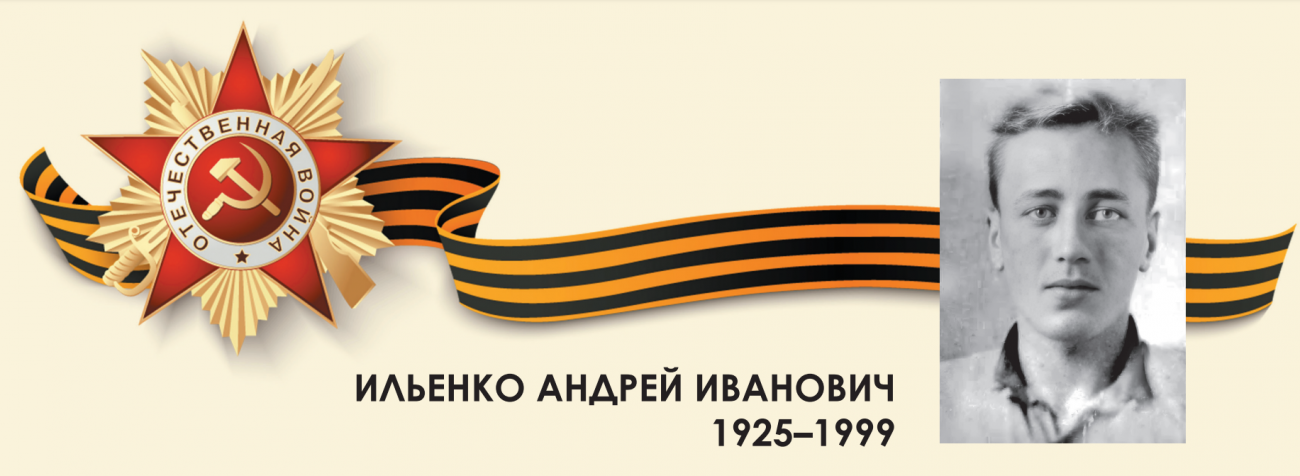
We continue to relay the stories of the employees of the IEE RAS, participants of the Great Patriotic War.
Ilyenko Andrey Ivanovich at the beginning of the war was on duty on the roof of the old university, on Mokhovaya. Then there was a short evacuation and work in Prokopyevsk. Then the Sverdlovsk Artillery School and the Ukrainian Front. He was seriously wounded in connection with this early mobilization. He was awarded the medal "For Military Merit".
In 1956 he graduated from the Department of Vertebrate Zoology of the Biology and Soil Faculty of Moscow State University. He defended his PhD dissertation. Ilyenko headed the laboratory of radioecology of the A.N. Severtsov Institute of Evolutionary Morphology and Animal Ecology. He is considered to be the founder of radioecology. The works of A.I. Ilyenko can rightfully be considered the "golden fund" of domestic ecology. Andrei Ivanovich also left his mark on domestic cynology, finding time to improve the West Siberian Laika breed, achieving its versatility.
In his memoirs about the war, Andrei Ivanovich wrote:
“The beginning of the Great Patriotic War found me in Perm. I was a collector on an archaeological expedition. The expedition stopped its work, since all the male staff (except me) turned out to be of draft age. On June 23, my senior comrades with great difficulty put me on a train, entrusting me with the care of naval pilots who were being transferred to the front. I had a jar of jam and two kilograms of gingerbread. With this supply, I traveled for several days to Moscow. At all the stations and stops, the train stood for a long time, letting echelons with troops, guns and tanks pass to the West.
On July 4, 1941, I was already working as an apprentice electrician at the Moscow State University telephone exchange in the old building. The most vivid impressions of this time were the bombing of Moscow. I often had to be on the roof of the main building of the University during the raids. My post was in the attic above the geography department. All MSU employees at that time were either in the fire brigade, or in the ambulance, or in other teams. Everyone was in barracks and spent the night within the walls of the University.
When you look from the roof in the city center, an unforgettable military panorama opens up. On the roof of the Moscow Hotel there is an anti-aircraft battery, on the buildings inside the Kremlin there are platforms with anti-aircraft machine guns. The entire Manezhnaya Square is painted to look like the roofs of houses. If the raid began at night, German planes dropped flares over Moscow on parachutes, showering the entire city center with incendiary bombs. Tracer bullets and shells flew into the sky from all sides. Shrapnel clicked on the iron roof. It was beautiful and scary. Once I managed to put out an incendiary bomb in the attic of the University. Then I worked in factories in Siberia and the Urals. Komsomol members were eager to get to the front, held the district committee and the military registration and enlistment office under siege. Everyone, starting with the director, applied, but only one person was accepted. Only later, having deceived the military commissar, I and one of my comrades managed to escape from the plant and join the army. I fought as a loader, and then as a gunner of an anti-tank gun.
On December 2, 1943, our brigade went on the offensive with the task of capturing the railway station and the settlement of Čanovichi. In this difficult battle against the German infantry and large tank units, many of my comrades died, and I myself was wounded. The wound was serious.
I lay in hospitals until the end of February 1944, and after the commission I was demobilized "due to limited fitness". For me, the war was over.
Now, remembering this difficult time for our Motherland, it’s amazing to think what an enormous feat our people accomplished. This is especially true for the youth, who selflessly worked in the rear and showed steadfastness in battle. We had no doubts about our victory."
